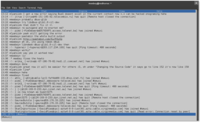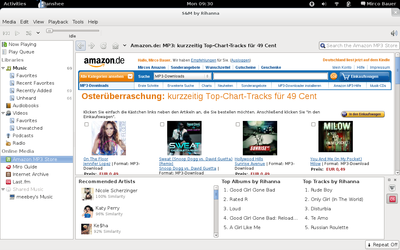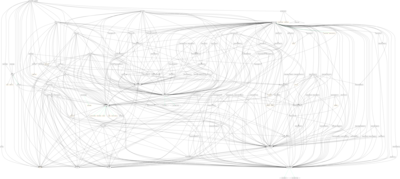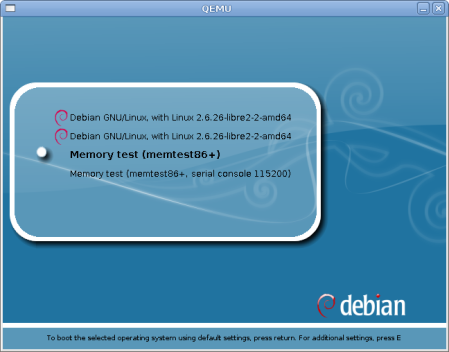Just in time for 2012 I am very pleased to announce Smuxi 0.8.9 codenamed
"One Giant Leap". During the development
56 bug reports and
33 feature requests in
593 commits were worked on making
this release a
major milestone of the Smuxi project. At the
Chaos Communication Congress (28C3) in Berlin I was doing the final
development sprint to get
0.8.9 done, which was a very intensive and
refreshing experience.
Here are the highlights of this release:
Development Builds / Rolling Releases
After the 0.8 release it became clear that a continious and short
development -> test cycle is important to keep the project going
quickly. At some point I have received requests if the project is dead while
it was more active than ever. The lack of new releases (for about 15 months)
lead to this wrong impression. Thus Smuxi can be obtained from
development builds now. This includes
daily builds for
Debian (Squeeze, Wheezy, Sid),
Ubuntu (Lucid, Maverick, Natty, Oneiric, Precise) and Windows. Thanks goes to
Hannes Tismer for providing the Windows autobuilder and to Canonical for the
PPA autobuilder.
We invite everyone to use these daily builds to keep track of the latest
development of Smuxi. Issues and regressions are fixed in a very short period
(usually the same day). Thanks to our users who ran development builds and
reported issues which led to many bug fixes prior to this release.
On the other hand one of my New Year's resolutions are to
"release early, release often"

So there should be
no nerd left behind...

Mac OS X support
With the help of Steven McGrath (Steve[cug]) who created the initial Mac OS X
installer for Smuxi we now have official support for Mac OS X. The
download page contains the instructions how to obtain and install Smuxi on
Mac OS X. This makes the 4th platform where Smuxi can be used on besides
Windows, Linux and *BSD.
For now Smuxi 0.8.9 doesn't feel as native as it could as it relies on the GTK+
port. We are looking into
enhancing the experience though, just
stay tuned.
Chat History on Disk (Beta)
The most exciting feature in this release I think are the
"persistent message buffers". With this feature I could solve one of the
biggest drawbacks IRC ever had: IRC does not retain any messages you have sent
or received. All messages are only relayed to all users. The issue is that if
you close your IRC client or even just leave a channel, all your received
messages are
gone.
One workaround in most clients was to create text log files which then contains
the chat history, but it is annoying and not user-friendly to open some text
file somewhere from your disk to read the history
outside of your IRC client.
Now with Smuxi 0.8.9 you no longer have this issue, all chat history gets
automatically written and read to a message database when you start Smuxi,
join channels or open queries! As this feature is not fully stable yet it is
not enabled by default. If you want to try it go to: File -> Preferences ->
Interface and change "Persistency Type" from "Volatile" to "Persistent", hit OK
and restart Smuxi. Now all messages are saved into the database and will
automatically be shown.
Click here for a screencast of this feature
Jabber / XMPP Support (Beta)
You probably have friends not on IRC and Twitter, say on Jabber, gTalk or
Facebook? This is where the new XMPP engine of Smuxi comes into play. You can
send and receive messages to/from them now! The implementation is far from
complete, though. It has no buddy list for example and needs only to be treated
as a
technical preview of what will be coming in future Smuxi releases.
Click here for a screencast of this feature

Text Interface (Alpha)
This is the first release that contains a text frontend based on the
STFL library. STFL is a library that uses ncurses to draw text based
user interface using a markup language (like Glade for GTK+). This frontend
is in early alpha state and lacks a lot of interface features and likes to
crash. It is still included to attract potential developers who want to enhance
this frontend. The frontend can be enabled by passing --enable-frontend-stfl
to the configure script and then by executing smuxi-frontend-stfl.
NetworkManager Support
Everyone with a laptop knows how annoying it can be to suspend and resume when
network based applications suddenly go crazy because they have lost the
connection and either spew errors or take forever to get back in shape. Smuxi
will now detect the network state right away with the help of the new
Network Manager support. It automatically reconnects when needed right
away for you.
Next Generation Internet Support
You can now connect to IRC servers using the
IPv6 protocol
Enhanced Find Group Chat Support
Users had real issues to find out how to search for channels, thus Bianca Mix
added a neat feature. The
/list command will now simply open the
Find Group Chat dialog for you. This way everyone used to IRC will find it in
no time. Searching for channels on freenode wasn't working correctly, this is
now
fixed. Smuxi also supports the
SAFELIST feature of the IRC
protocol now which allows to retrieve a full channel list and do client side
search which makes consecutive searches much faster.
Enhanced Windows Experience
For a long time you could not use Smuxi with the latest GTK# version of 2.12.10
on Windows. The issue was that Smuxi relied on SVG support which 2.12.10 no
longer had. Smuxi is no longer using SVG instead it uses pre-scaled PNG images
thus it works just fine with
GTK# 2.12.10 on Windows now. At the same
time the issue that the maximized state of the main window was left when
restoring from task bar is
fixed with GTK# 2.12.10.

Smuxi used by default the FixedSys font on Windows to give it the typical IRC
look most people are used to. Since Windows Vista there is a better
console-like font available called Consolas. Smuxi will now
use the Consolas font instead on Windows Vista or later.
Another important enhancement is that Smuxi no longer has issues with
multiple GTK+ installs on the same computer, which was getting more
common with more popular ported GTK+ applications such as GIMP or Pidgin.
SSL for IRC fixed
IRC with SSL was only working with the default port of 6697. Thanks to Jo
Shields now
any port can be used with SSL.
Crash Related Issues
Desktop notifications could
crash Smuxi in case
of errors related to the notification system or an
absent notification daemon. There was a chance that the
crash dialog simply disappeared which made reporting bugs more
difficult no longer happens.
Rapid use of ctrl+w,
/window close (Jimmie Elvenmark) and
opening the Find Group Chat dialog on the Smuxi tab do no longer crash.
Also
number-only network names,
/network switch freenode and
GTK+ install without SVG support no longer lead into a crash.
Enhanced Notice Handling
Notices will no longer open query tabs for you instead it will
show them on tabs you share with the person who sent it with the server
tab as fallback. This also avoids
ChanServ, NickServ and spammy IRCop
tabs.
Twitter fixes
Twitter made some changes to their API which broke the Twitter support of
Smuxi 0.8. This was taken care of and also
a few other
issues were solved allowing Smuxi 0.8.9 to work smoothly with Twitter
again.
Extended Keybindings
Smuxi allows now to use the
ctrl+tab / ctrl+shift+tab and
ctrl+n / ctrl+p keys to switch tabs. The keybindings still work even
with a
hidden menu bar now.
Smuxi Server specific highlights
More interactive and much faster synchronization
When connecting to a smuxi-server you had to wait till Smuxi finished the
synchronization before you could use the interface. Also you could not tell how
far the synchronization was and just had to wait till it was completed.
With Smuxi 0.8.9 the connect just takes a few seconds and all chats are
synchronized in the background with
a progress bar so you can use the
interface from the first moment on and know how far it is. The speed how much
it takes to synchronize all chats also reduced drastictly by 400%!
Click here for a screencast of this feature
More background communication
When using a smuxi-server the interface sometimes had load times like when
opening the preferences or when using the
nickname completion
(Andrew Kannan). These operations are done in the background and no longer
blocks the interface. Also when the communication is lost to the smuxi-server
the frontend will now automatically reconnect to it in the background.
Low Bandwidth Mode
When it comes to mobile internet connectivity such as UMTS/HSDPA, Edge and GRPS
it can be a real pain to connect to the smuxi-server as it has to transfer all
the messages over that. If you just want to ask someone you know then you don't
need any old messages to do that. With the
"Low Bandwidth Mode" you can
now connect to the smuxi-server without loading old messages which makes the
connect very quick. You find this option in the engine connect dialog.
Stable Protocol
Initially I didn't plan to make the protocol of Smuxi stable before the 0.9
release, but as it turned out the 0.8 protocol was good enough to still use
it and for that reason Smuxi 0.8.9 is still compatible with 0.8. The 0.8
protocol will see no breakages, instead the next protocol will be on-top or
opt-in of the current one. This means future Smuxi versions
stay compatible with it.
Shutdown Command
You can now shutdown the smuxi-server if you like using the
/shutdown command. It it safe to use the command, it will do a clean
shutdown sequence for you. For example it makes sure all messages are written
to disk in the case of enabled persistent message buffers. If you have your
smuxi-server daemon monitored (e.g. with runit) it can also automatically be
restarted and upgraded this way.
Built-in SSH Keyfile Support
It is no longer needed to fiddle with the .ssh/config file or pagent to get
SSH key authorization working. You can now simply tell Smuxi which
SSH keyfile you want to use to connect to your smuxi-server.
Updated Translations
- Catalan (Siegfried-Angel Gevatter Pujals)
- Danish (Joe Hansen)
- Finnish (Kalle Kaitala)
- French (Cl ment Bourgeois)
- German (Bianca Mix)
- Italian (Vincenzo Campanella)
- Portuguese (Americo Monteiro)
- Spanish (Castilian) (Ricardo A. Hermosilla Carrillo)
New Translations
- Chinese Simp (Dean Lee)
- Slovak (Tom Vadina)
- Swedish (Jimmie Elvenmark)
- partially Russian (Aleksandr P)
- partially Turkish (Umut Albayrak)
- partially Urdu (makki)
Contributors
Contributors to this release are the following people:
- Mirco Bauer (497 commits)
- Tuukka Hastrup (10 commits)
- Bianca Mix (10 commits, translations)
- Cl ment Bourgeois (8 commits, translations)
- Andrius Bentkus (5 commits)
- Carlos Mart n Nieto (3 commits)
- Jimmie Elvenmark (3 commits, translations)
- Hannes Tismer (1 commit)
- Jonathan Pryor (1 commit)
- Jo Shields (1 commit)
- Siegfried-Angel Gevatter Pujals (translations)
- Dean Lee (translations)
- Aleksandr P (translations)
- Americo Monteiro (translations)
- Andrew Kannan (translations)
- Joe Hansen (translations)
- Kalle Kaitala (translations)
- makki (translations)
- Ricardo A. Hermosilla Carrillo (translations)
- Tom Vadina (translations)
- Umut Albayrak (translations)
- Vincenzo Campanella (translations)
Thank you very much for your contributions to Smuxi!
After reading this whole pile of text, head over
here and grab
this smexy stuff!
 (This blog post is a more firm version of a series of tweets and forum posts I made a few weeks ago. This should also be considered a refresh of this post by Mirco Bauer a few years ago)
It has been said that Mono is bloated, and that people should use lighter frameworks that don t pull in hundreds of meg .
How much basis in reality is there for those comments?
Well, let s do a little thought exercise. How much space is the minimum space needed for several languages to work?
For this experiment, we will be looking at the required installation size on disk of several language frameworks, each time installing the bare minimum for a command-line hello world app in that language to run. For example, the Ruby result is the minimum install required to run:
(This blog post is a more firm version of a series of tweets and forum posts I made a few weeks ago. This should also be considered a refresh of this post by Mirco Bauer a few years ago)
It has been said that Mono is bloated, and that people should use lighter frameworks that don t pull in hundreds of meg .
How much basis in reality is there for those comments?
Well, let s do a little thought exercise. How much space is the minimum space needed for several languages to work?
For this experiment, we will be looking at the required installation size on disk of several language frameworks, each time installing the bare minimum for a command-line hello world app in that language to run. For example, the Ruby result is the minimum install required to run:

 So there should be
So there should be 


 Well hello there.
A couple of days ago my
Well hello there.
A couple of days ago my 


 There is a reason it's called experimental isn't there?
In
There is a reason it's called experimental isn't there?
In  [ If you haven't heard of this debate yet, you probably want to read
[ If you haven't heard of this debate yet, you probably want to read 




 It s obviously not perfect, and it uses the old visual style from Debian Lenny, but it s a fully Free starting point, which hopefully can be deconstructed by others seeking to make their own themes. It ought to scale fully to any 4:3 resolution. And it may explode and eat your disk on any version of GRUB2 Experimental other than r1499. Generally, the README is a good starting point.
Oh yes, an URL. Try
It s obviously not perfect, and it uses the old visual style from Debian Lenny, but it s a fully Free starting point, which hopefully can be deconstructed by others seeking to make their own themes. It ought to scale fully to any 4:3 resolution. And it may explode and eat your disk on any version of GRUB2 Experimental other than r1499. Generally, the README is a good starting point.
Oh yes, an URL. Try